Episodes
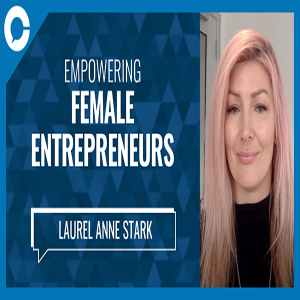
Sunday Nov 01, 2020
Empowering Female Entrepreneurs: Laurel Anne Stark
Sunday Nov 01, 2020
Sunday Nov 01, 2020
Ep 313 - Empowering Female Entrepreneurs
Guest: Laurel Anne Stark
“Self-employment should empower women to earn more money, but studies show the wage gap persists in self-employment and it’s even worse in the gig economy for many entrepreneurial women. Regardless of parity in education, work experience, number of hours worked or occupation, women earn less than men in self-employment,” says Laurel Anne Stark, an entrepreneur and co-author of a new report on the State of Female Entrepreneur Mental Health.
Key to understanding the reasons why women face unique challenges lies in their motivation to start a business. For women, many (if not most) have to start a business because they have few employment choices. Women tend to be entrepreneurs of necessity, which means they were victims of a system that didn’t compensate them appropriately, didn’t promote them, their work-life balance was off-balance or they were harassed – to name but a few of the reasons for going out on their own.
The good news is that research shows women are uniquely suited to entrepreneurship. They are adept at understanding the needs of others, which is essential in the development of strong client relationships. As well, Stark says, “Their potential is enormous given their ability to succeed and exceed the profitability of many companies created by men, despite the crippling barriers they face.” One such barrier is access to capital. Stark says, “The harsh reality is, women simply do not have the same access as men do to financing.”
While launching an enterprise ought to provide protective factors for women such as increased control over work schedules and a better work life balance, it does not alleviate the concerns that motivated women to start a business. Stark says, “Our research shows self-employment does not provide relief from gender bias, the gender pay gap, workplace harassment or the other stressors unique to women.” Add it all up and female entrepreneurs burn out more frequently and are significantly more likely to encounter mental health challenges than their male counterparts.
I invited entrepreneur Laurel Anne Stark to join me for a Conversation That Matters about empowering female entrepreneurs with the resources needed to support a vital sector of our economy.
Conversations That Matter is a partner program for the Morris J Wosk Centre for Dialogue at Simon Fraser University. The production of this program is made possible thanks to the support of the following and viewers like you.
Please become a Patreon subscriber and support the production of this program, with a $1 pledge https://goo.gl/ypXyDs
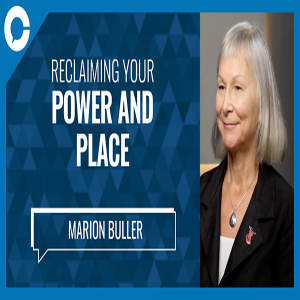
Sunday Nov 01, 2020
Marion Buller: Reclaiming Power and Place
Sunday Nov 01, 2020
Sunday Nov 01, 2020
Ep 312 - Reclaiming Power and Place
Guest: Marion Buller
“Persistent and deliberate human and indigenous rights violations and abuses are the root causes behind Canada’s staggering rates of violence against indigenous women, girls and Two-Spirited people.” This is stated in the final report of the National Inquiry into Missing and Murdered Indigenous Women and Girls. The numbers are horrible: indigenous women, girls and Two-Spirited individuals are 12 times more likely to experience violence and seven times more likely to be murdered.
Chief Commissioner Marion Buller says, “The inquiry was gut wrenching. It was difficult to hear the stories of survivors. However, those stories needed to be told, they needed to be heard, and they needed to be recorded.” The final report contains the truths of more than 2,300 family members, survivors, experts and traditional knowledge keepers that were shared over the two-year mandate of the inquiry.
There are 231 calls for justice in the final report: calls for justice that are directed at all Canadians and at every level of government, for First Nations through to the federal government – calls for justice that some feel will go unheard. Buller disagrees. “The act of acknowledging and recording the truths of victims' families, survivors and others raises awareness and that [in] its very nature instigates change: change that takes time, but change that has already begun. One of the lessons I have learned working in the justice system is that real change has to happen at the grassroots.”
We invited MMIWG Chief Commissioner Marion Buller to join us for a Conversation That Matters about the path forward in reducing harm and violence afflicting indigenous women, girls and Two-Spirited people.
Conversations That Matter is a partner program for the Morris J Wosk Centre for Dialogue at Simon Fraser University. The production of this program is made possible thanks to the support of the following and viewers like you.
Please become a Patreon subscriber and support the production of this program, with a $1 pledge https://goo.gl/ypXyDs
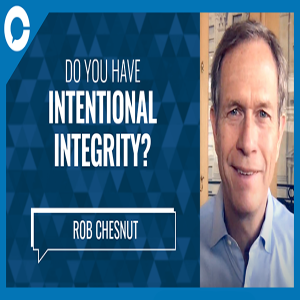
Sunday Nov 01, 2020
Rob Chesnut: Intentional Integrity
Sunday Nov 01, 2020
Sunday Nov 01, 2020
Ep 311 - Intentional Integrity - Do you have it?
Guest: Rob Chesnut
Are you honest in all you do? Do you have integrity? You’d probably like to think you are. The reality is like most of us, you may be soft around the edges. You might hold back the truth a little here and a bit there. It’s easy to justify that you’re doing so because you have your eye on the bigger picture.
And if you cheat a little here and little there, you do so in the belief that you know where to draw the line. Small things unfortunately lead to bigger things and they shift because what was unacceptable yesterday is today’s norm. It’s like a man who is growing a beard. It started off as not shaving for a few days, then after a little while and somewhere along the way, it became a beard. It’s difficult to define that moment when it went from not shaving to a beard because it changed status due to the accumulated aggregation of change.
The same is true of lying and cheating – in communities where we know our neighbours and the store owners we buy from; in places where employers and employees know each other and their families’ impact of dishonesty is more direct. However, as we grow into a global international chain store online marketplace, buyers and sellers don’t know each other. That, in turn, makes it easier to turn a blind eye to transgressions.
Rob Chesnut has spent his career dedicated to telling the truth, first as a US Federal Prosecutor and then as the ethics lead at major online organizations in the sharing economy. Chesnut, in his new book “Intentional Integrity,” asks and answers questions like, “Are these platforms enabling new flexible ways of working that unlock human potential, or just enabling large companies to exploit ‘gig’ workers by avoiding employment laws?”
We invited Robert Chesnut, the author of Intentional Integrity to join us for a Conversation That Matters about integrity, the challenges of being a person of integrity and why it is vitally important that we demand it of ourselves and others.
Conversations That Matter is a partner program for the Morris J Wosk Centre for Dialogue at Simon Fraser University. The production of this program is made possible thanks to the support of the following and viewers like you.
Please become a Patreon subscriber and support the production of this program, with a $1 pledge https://goo.gl/ypXyDs
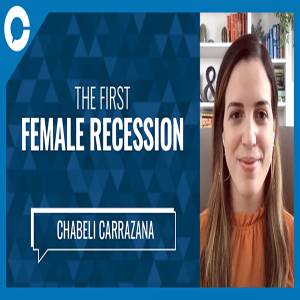
Sunday Nov 01, 2020
Chabeli Carrazana: The First Female Recession
Sunday Nov 01, 2020
Sunday Nov 01, 2020
Ep 310 - The First Female Recession
Guest: Chabeli Carrazana
More than 11 million women lost their jobs in North America between February and May 2020. Chabeli Carrazana explains, “The losses erased decades of job gains by women in the labour force.” She goes on to say, “About eight per cent of the women who lost their jobs stand zero chance of being called back to work.”
Heidi Shierholz, a senior economist and director of policy at the Economic Policy Institute, agrees. “There is a real possibility many jobs lost by women will never come back.” It is a shocking loss of employment and representation of women in the labour market.
According to Carrazana, “In January, when unemployment in the US was just 3.6 percent – among the lowest recorded rates in the last 60 years – women were the majority of the workforce and within weeks, that all changed.” Carrazana reports, “In 1958, women made up less than a third of the labour force. It took 30 years to reach 45 percent, a pace of growth that ushered in the most significant change in labour markets in the past century.”
The job losses cross all sectors – less so in management but even there, women were more likely to cut back or lose their job. Carrazana says, “The realities of the lopsided division of care inside homes has been on full display since the pandemic hit. Women in 2020 still take on the overwhelming majority of child care responsibilities.” And then child care facilities started to close – a double-hit. One in four women in child care lost their jobs and without child care, more women either had no choice or opted to stay at home to look after their children.
I invited Chabeli Carrazans of the 19th to join me for a Conversation That Matters about the devastating impact of COVID-19 on women and the employment realities that are crippling them professionally and financially today and for decades to come.
Conversations That Matter is a partner program for the Morris J Wosk Centre for Dialogue at Simon Fraser University. The production of this program is made possible thanks to the support of the following and viewers like you.
Please become a Patreon subscriber and support the production of this program, with a $1 pledge https://goo.gl/ypXyDs
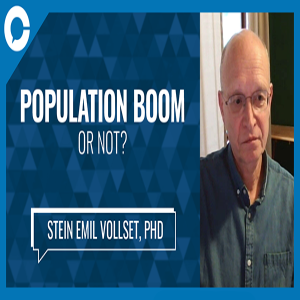
Sunday Nov 01, 2020
Population predictions - Stein Emil Vollset
Sunday Nov 01, 2020
Sunday Nov 01, 2020
Ep 306 - Population
Guest: Stein Emil Vollset, PhD
A new study, published by The Institute for Health Metrics and Evaluation, estimates the global population will rise through to the mid-60s and then plummet in much of the world, while soaring in Africa. The study examines fertility, mortality and migration, and projects global population to rise to 9.7 billion in 2065 and then rapidly decline by close to one billion people by the end of the century.
Beyond the numbers are the dramatic population drops in Europe, most of Asia, South and Central America, juxtaposed against large increases in Africa. The societal and economic challenges will be immense. No one country can address the issues alone that will arise.
We invited Dr Stein Emil Vollset, the lead author of the extensive report on global populations, to join us for a Conversation That Matters about the significance of huge population swings on countries around the world.
Conversations That Matter is a partner program for the Morris J Wosk Centre for Dialogue at Simon Fraser University. The production of this program is made possible thanks to the support of the following and viewers like you.
Please become a Patreon subscriber and support the production of this program, with a $1 pledge https://goo.gl/ypXyDs
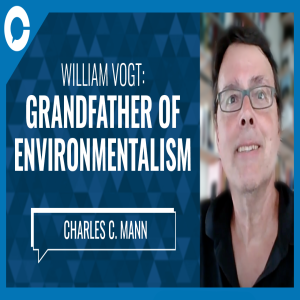
Sunday Sep 13, 2020
Charles C Mann: William Vogt - The Grandfather of Environmentalism
Sunday Sep 13, 2020
Sunday Sep 13, 2020
Ep 304 - William Vogt - The Grandfather of Environmentalism
Guest: Charles C. Mann
Chances are you have never heard of William Vogt yet, according to Author Charles C. Mann. “His philosophy is one of the few that was born in the last century and is as relevant today, if not more, than when Vogt started campaigning to save the environment.”
William Vogt is responsible for defining “The Environment” which, before he so perfectly gave shape to the environment as a global and interconnected system, ecological issues were deemed to be local or site specific. Mann goes into great detail in his book, The Wizard and The Prophet”, about Vogt and the development of his philosophy that says “the carrying capacity of the earth is limited.” Vogt believed that the biggest threat to Mother Nature is an outbreak of humans.
I invited Charles C. Mann to join me for a Conversation That Matters about the incredible influence of William Vogt in shaping the environmental movement.
Conversations That Matter is a partner program for the Morris J Wosk Centre for Dialogue at Simon Fraser University. The production of this program is made possible thanks to the support of the following and viewers like you.
Please become a Patreon subscriber and support the production of this program, with a $1 pledge https://goo.gl/ypXyDs
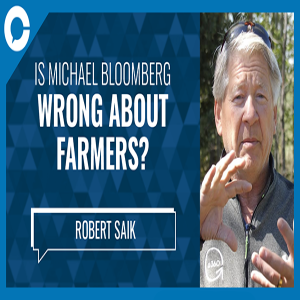
Monday Sep 07, 2020
Robert Saik - Was Bloomberg Wrong about Farmers?
Monday Sep 07, 2020
Monday Sep 07, 2020
Ep 303 - Was Bloomberg Wrong about Farmers?
Guest: Robert Saik
Yum yum, food – glorious nutritious and delicious food produced in Canada. In his book, Food 5.0 Agrologist and international consultant Robert Saik points out that less than 0.2 percent of the population of this country are farmers of consequence. That’s just enough people to fill the stands at a professional hockey arena and it’s enough skilled people to feed Canada and millions – if not billions – of others around the world.
Contrary to what Michael Bloomberg said: “I could teach anybody to be a farmer. It’s a [process]: you dig a hole, you put a seed in, you put dirt on top, add water, up comes corn.” Not even close, says Robert Saik: “The production of food is extremely complex. Seed varieties change to meet soil and weather conditions on a county-by-county basis. Tractors use laser guided GPS systems to line up row after row of seeds.” Tilling is a doctoral study unto itself. In the vast prairies of North America, tillage is an out-of-date practice, yet tilling the soil in the wetlands of coastal BC may or may not be required depending on soil conditions. There is no-one-size-fits-all in agriculture.
To grow food, you need four elements: fertile soil, sun, water and carbon. Those are the building blocks of photosynthesis, a combination that has to be just right. Getting it just right is not easy. Rain, snow, hail, wind individually and, at times, collectively make farming an art that relies on science and technology to get it right.
Saik says, “The next 30 years are arguably the most challenging years in agriculture's history. As the global population grows from 7.6 to 9.5 billion people, the question is, ‘Will we be allowed to feed them?’” Saik contends that agricultural policies that are developed by voters who have never set foot on a farm, mixed in with a heavy application of the precautionary principle, those policies will ensure we cannot feed the world.
We invited Robert Saik, author of Food 5.0 and ag industry thought leader, to join us for a Conversation That Matters about the remarkable world of farming in Canada.
Conversations That Matter is a partner program for the Morris J Wosk Centre for Dialogue at Simon Fraser University. The production of this program is made possible thanks to the support of the following and viewers like you.
Please become a Patreon subscriber and support the production of this program, with a $1 pledge https://goo.gl/ypXyDs
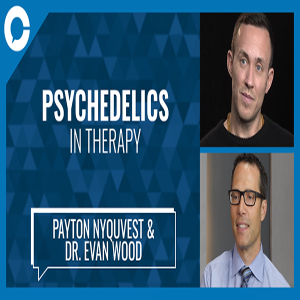
Saturday Aug 22, 2020
Dr Evan Wood and Payton Nyquvest: Psychedelics in Therapy
Saturday Aug 22, 2020
Saturday Aug 22, 2020
Ep 302 - Psychedelics in Therapy
Guest: Dr Evan Wood - Payton Nyquvest
The numbers are staggering. Mental health is crippling Canada.
Here are the estimated costs both human and financial: One in five Canadians suffer from an addiction in any given year. Fifty percent of us will experience a major depressive episode. PTSD affects close to 10% of the population and 4,000 Canadians will take their own lives this year.
Payton Nyquvest - the founder of Numinus, a Vancouver-based company - is working with Dr Evan Wood to address these pressing issues, utilizing the potential of psychedelics in mental health treatment. Nyquvest openly admits he was struggling with depression. He says, “I had to get treatment, lasting treatment. I sought it out internationally and it worked.” It worked so well, he set out to provide the same opportunity for others in Vancouver.
Dr Evan Wood, a leading figure in addiction research and treatment, is the company’s Chief Medical Officer. Wood says, “Studies at Johns Hopkins University and other institutions are showing tremendous gains in mental health and addiction outcomes when psychedelics are added. The therapeutic outcomes are significantly better than current common treatments. It’s cutting edge but it is an exciting development in treatment.”
We invited Dr Evan Wood and Payton Nyquvest of Numinus to join us for a Conversation That Matters about the positive outcomes psychedelic treatments are offering in therapy.
Conversations That Matter is a partner program for the Morris J Wosk Centre for Dialogue at Simon Fraser University. The production of this program is made possible thanks to the support of the following and viewers like you.
Please become a Patreon subscriber and support the production of this program, with a $1 pledge https://goo.gl/ypXyDs
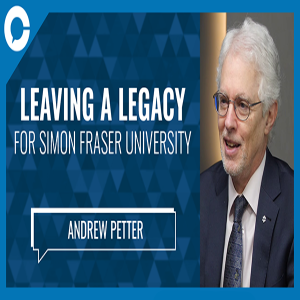
Friday Aug 14, 2020
Andrew Petter's Legacy
Friday Aug 14, 2020
Friday Aug 14, 2020
Ep 301 - Petter’s Legacy
Guest: Andrew Petter
As he wraps up ten years at the helm at Simon Fraser University, Andrew Petter says, “Universities are more important now than ever. In a post-COVID environment, universities have a vitally important role to play in scientific research, addressing workplace dislocation with retraining of talented people who will play a role in restarting and shifting the economy.”
Petter says that the role of the university is paramount in addressing “diversity, equality, inclusion and innovation in a greener economy.” COVID-19 has exposed inequalities in society and in the workplace. Petter says, “Many of the people who work on the frontlines have been hard hit. There is now an opportunity to harness education right across the spectrum to harness the capacity of education to retrain and upskill people and, in doing so, provide them with greater opportunities and level the playing field.”
We invited Andrew Petter to join us for a Conversation That Matters about his term as President of Simon Fraser University, how it has changed and grown during his term, and his thoughts about the future of university education.
Conversations That Matter is a partner program for the Morris J Wosk Centre for Dialogue at Simon Fraser University. The production of this program is made possible thanks to the support of the following and viewers like you.
Please become a Patreon subscriber and support the production of this program, with a $1 pledge https://goo.gl/ypXyDs
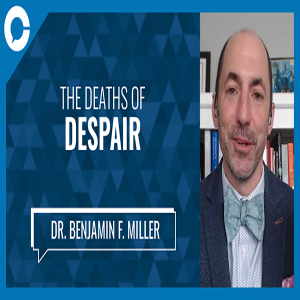
Friday Aug 14, 2020
Dr Benjamin Miller: Deaths of Dispair
Friday Aug 14, 2020
Friday Aug 14, 2020
Ep 300 - Covid - 19 Deaths of Despair
Guest: Dr Benjamin F. Miller
In May in British Columbia, 170 people died from suspected illicit drug use: that’s more than five people a day. That’s a 93 percent increase in death due to overdose over last May. Compare that to 52 deaths to COVID-19 in May and it is not unreasonable to ask if the spike in overdose deaths is related to the lockdown associated with C-19.
According to Well Being Trust, the number of additional deaths attributable to COVID-19, as a result of deaths of despair, could be as high as 150,000 people in the US. Death from alcoholism, drug overdoses and suicide, also known as deaths of despair, were already at record levels in the United States before COVID-19.
Dr Benjamin F Miller says, “We know the stressors that accompany this pandemic. They are job loss and financial instability, anxiety, grief, depression and other factors. Add in social isolation, a loss of hope and many health care programs that weren’t accessible.” Miller follows up saying he is very worried about people who need help.
We invited Dr Benjamin F. Miller of Well Being Trust to join us for a Conversation That Matters about the desperate need to reopen assistance programs that can and will save lives.
Conversations That Matter is a partner program for the Morris J Wosk Centre for Dialogue at Simon Fraser University. The production of this program is made possible thanks to the support of the following and viewers like you.
Please become a Patreon subscriber and support the production of this program, with a $1 pledge https://goo.gl/ypXyDs

